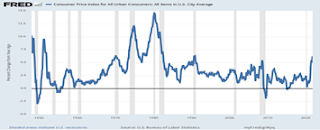Why the supply-chain bottlenecks and soaring inflation? “It’s the pandemic, stupid.” economists and industry leaders are saying.
President Biden’s $1.2 trillion Infrastructure Investment and Jobs Act (IIJA) was passed just in time to slow the inflation climb and make for a merrier Christmas.
Consumers and producers are worried because the consumer price index jumped 0.9% last month, the government said Wednesday. The pace of inflation over the past year marched to 6.2% in October from 5.4% in the prior month. That’s triple the Federal Reserve’s 2% target and is the highest rate since November 1990.
But even the latest price spike following last year’s pandemic-induced recession was barely higher than that following the 2007-9 recession (gray bar), per the above FRED graph of CPI inflation rates.
Economists such as Obama’s chief economic advisor, Austin Goolsby, are saying this is a one-of-a-kind slowdown caused by the pandemic. “The most important thing to watch if you want to understand the economy is, as has been the case for a year and a half now, the progress made against the virus,” said Goolsby in a recent NYTimes Op-ed.
Why will the new infrastructure bill create a merrier holiday season? Because it jump-starts a renewal of public investment in America’s future with the largest spending programs since Roosevelt’s New Deal.
The bill provides $110 billion to repair the nation's aging highways, bridges and roads. According to the White House, 173,000 total miles of America's highways and major roads and 45,000 bridges are in poor condition. And the almost $40 billion for bridges is the single largest dedicated bridge investment since the construction of the interstate highway system, according to the Biden administration.
“The bill is a significant down payment on the $2.5 trillion infrastructure investment gap that was identified in the 2021 Report Card and will benefit American businesses and families for years to come,” says the American Society of Civil Engineers (ASCE).
“The bill represents a historic, once-in-a-generation investment in our roads, bridges, water and wastewater networks, ports, electric grid, dams, and more. It increases funding, makes smart improvements to policy such as streamlining permitting, and it creates new programs targeted at almost all 17 categories in the 2021 Report Card for America’s Infrastructure, according to the ASCE.
Specifically, the IIJA includes a reauthorization of our surface transportation programs, the Drinking Water and Wastewater Infrastructure Act, as well as an additional $559 billion in new spending that is a combination of targeted funds for overdue state of good repair projects, but also forward-looking programs and policy to make our infrastructure more resilient, said ASCE.
These funds include:
- $110 billion for roads, bridges, and major projects;
- $66 billion for passenger and freight rail;
- $65 billion for broadband internet;
- $46 billion for resilience to help states and cities prepare for droughts, wildfires, climate change, and more;
- $39 billion for public transit; and
- $17 billion for ports and waterways.
This is just a down payment on what needs to be done to bring the American economy into the 21st century, according to the Federal Reserve Chair Janet Yellen: “We are now engaged in the most important economic project in recent history: Repairing the broken foundations of our economy, and on top of them, building something stronger and fairer than what came before.”
Consumers will continue to worry about inflation as much as the pandemic in the coming months. But the inflation rate is tied to the infection rate. How? Supply-chain shortages are causing the price hikes. And when millions more return to work (such as truck drivers) once the pandemic subsides sufficiently, this should in turn loosen the supply-chain constrictions, bringing down prices.
So, instead of saying, “It’s the economy, stupid.” we can say, “It’s the pandemic, stupid” that’s holding up the recovery.
Harlan Green © 2021
Follow Harlan Green on Twitter: https://twitter.com/HarlanGreen


No comments:
Post a Comment